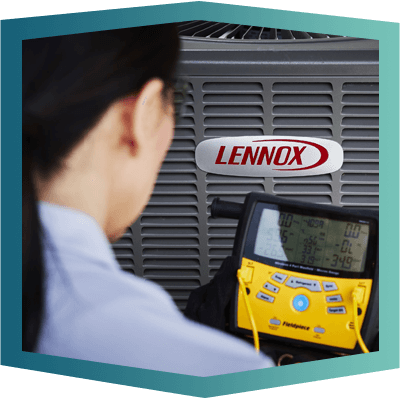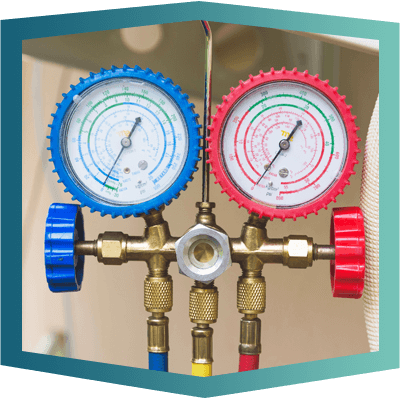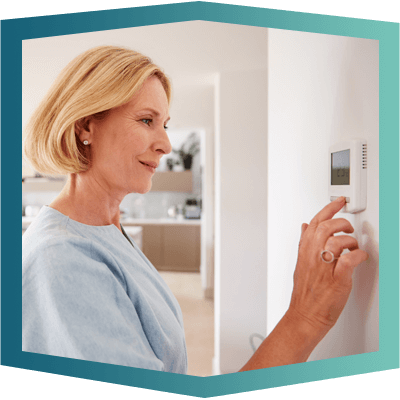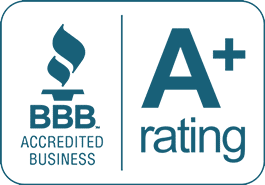We know there can be a lot of confusion surrounding the heating and cooling industry.
Below, we’ve answered some of the common questions we hear on a regular basis. At arctic air, we believe in providing straightforward and clear information to help you make informed decisions.
General
What does SEER stand for? How about HSPF?
SEER stands for Seasonal Energy Efficiency Ratio and is a general measure of how efficient a unit is. Higher numbers are better, just like MPG on a car. Older units were typically 6-12 SEER, while new units range from 13-25 SEER.
How much of my utility bill is due to my HVAC system?
The Department of Energy says that HVAC systems account for 48% of the utility bill in an average US household. Here in southern Utah, we tend to be a little higher (50-70%) due to our very hot summers. Your indoor set point and your system efficiency have the greatest impact on this percentage. If you’ve lived in your home for a year or more, you can usually get a close estimate by looking at your monthly utility bills and comparing the seasons. If you have a gas heater, you should see your gas usage go up in the fall, peak in the winter, and go back down in the spring. Your electric bill will do the opposite. Those changing costs are usually directly linked to your HVAC system.

Why is my AC leaking water?
During normal operation, your system generates condensation inside of the indoor unit as it cools your home, which then flows through the white PVC drain pipe to the outdoors. This is normal and no cause for concern.
However, if you see any water leaking in the inside of your home, it does need to be addressed. Please call us immediately to avoid further damage.
Maintenance
What maintenance is recommended for HVAC systems?
Your “outdoor” unit requires regular maintenance on keeping the coils and fins clean to maintain its performance. In addition, an annual check on the start and run capacitor, blower motor, compressor, and refrigerant levels will greatly reduce any unexpected failures.
Your “indoor” unit requires regular maintenance on the filters, condensation lines, and motor inspection. Carbon monoxide testing, gas pressure testing, an inspection of the blower wheel, and testing the safety features are also encouraged on a regular basis.
The Department of Energy recommends the following:
- Check for the correct amount of refrigerant
- Test for refrigerant leaks using a leak detector
- Capture any refrigerant that must be evacuated from the system, instead of illegally releasing it into the atmosphere
- Check for and seal duct leakage in central systems
- Measure airflow through the evaporator coil
- Verify the correct electric control sequence and make sure that the heating system and cooling the system cannot operate simultaneously
- Inspect electric terminals, clean and tighten connections, and apply a non-conductive coating if necessary
- Oil motors and check belts for tightness and wear
- Check the accuracy of the thermostat
How often should I change my filter?
Every HVAC system filter has a different recommendation to replace based on the thickness of the filter and the amount of use they receive each season. The more your system is on, the more your doors and windows are open, and the more people/pets you have in the home the more often you will need to change your filters. For example, if you have a 1’ filter and you run your system with the fan “on”, the filter may only last 1 month. If you turn the fan from “on” to “auto” the filter may last up to three months.
On average, you should change your 1” filters every few months. Thicker filters don’t usually have to be changed as often because they have more surface area. We have seen some 6-inch filters, last between 9 to 12 months before they need to be replaced.
Our general recommendations are as follows:
- 1″ Furnace Filter: 1 – 2 Months
- 3″ Furnace Filter: 2 – 3 Months
- 5″ Furnace Filter: 4 – 8 Months
Do I need to add refrigerant to my system?
Your air conditioning system is a closed system. This means that it doesn’t use up the refrigerant, and should never lose pressure. If you are low on refrigerant, it means that there is a leak somewhere, which should be located before proceeding. Sometimes it might be as simple as a loose service port. Other times, it might be a leak in one of the coils.
Either way, it should be addressed before adding more refrigerants in order to avoid future problems. Running a system with unresolved leaks often leads to issues with the compressor or other components.

How long does an average system last in Saint George?
According to the US Department of Energy, you can expect your air conditioner to last from 10 to 15 years. Here in Southern Utah, we’ve found the average to be around 12-13 years. The actual lifespan of an air conditioner varies depending upon factors, such as frequency of use, exposure to certain elements (saltwater, chemicals, animal urine, etc..), and regular maintenance. If properly cared for, average life can usually be extended for a few more years. Furnaces tend to have a similar lifespan. Even though we don’t use heating as often as most of the country, the blower in your furnace is used every time your air conditioning runs.
Troubleshooting
Why is my thermostat blank?
The most common reason is that it doesn’t have power (as opposed to being broken). First, replace the batteries if your thermostat has any. If it is still blank, make sure that your furnace or air handler has power. They usually have a switch or plug connecting them to the 120v power in your home. You should also check the breaker in your panel. If everything looks good and your thermostat is still blank, it’s probably time to call a contractor.
Word of caution: if your furnace trips a breaker, that is usually a sign that you might have a bigger problem.

Why is my air conditioner blowing hot air?
This question is tricky. Some causes are very simple and easy to fix, while others are indicative of a larger problem.
The first thing to check is your filter. Dirty filters restrict the air blowing across your indoor coil, which in turn causes the refrigerant lines and coil to freeze up. If your filter looks questionable, you can usually take care of this yourself. Turn your system to “off”, but leave your fan set to “On” (not auto). Wait a few hours (usually 4-5, if the fan is running, or 8-12 if not) for everything to thaw out. Change the filter while you wait, and then try running the system again.
If it still having problems, it could be one of the issues below:
While these are not all of the potential problems, they tend to be the most common.
- The system is low on refrigerant and has frozen up. Look for ice on the copper lines outside, or around your indoor unit. If you see any, turn your system to “off”, but leave your fan set to “On” (not auto). Then call your contractor to come to take a look.
- Start or run capacitor has failed. Capacitors are the most common repair on air conditioning systems, as they tend to only last about 5 years. Call a contractor and have them replace the capacitor.
- Compressor has failed. This is the worst-case scenario. Call a contractor to diagnose the compressor. Typically, this requires replacing the compressor or replacing the condensing unit.
What is that smell?
At the beginning of each heating season, you may experience a brief burning smell as the furnace burns of any debris that has accumulated in the furnace over the summer. This is common and shouldn’t last more than a few minutes. If it persists for more than an hour or gets very strong, turn the unit off and call your contractor.
Indoor Air Quality
Why are wood fixtures in my home cracking? Also, why does my piano need tuning so often?
These are typically humidity-related issues. Here in St. George, that usually means the humidity level in your home is too low. The most favorable environment for wood floors, pianos, guitars, and people is a relative humidity range between 45% – 60% and a consistent temperature of around 70 degrees. Sudden fluctuations in temperature and humidity levels should be avoided if possible. Whole-home humidifiers are sometimes an option if you are dealing with these issues.





